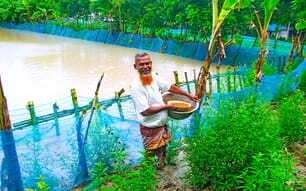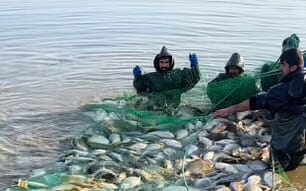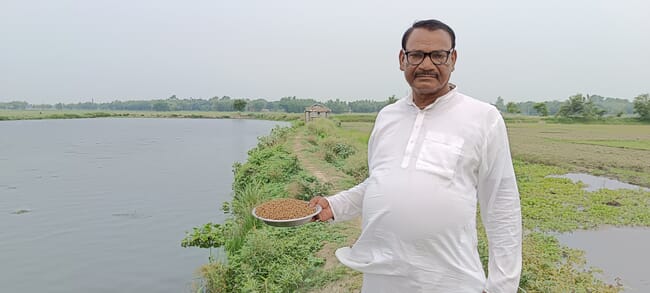
© Gurvinder Singh
What inspired you to embark on a career in aquaculture?
My father had a small agricultural field in this (Pipra) village of Supaul district but the income was barely enough to run the household. I passed my Class-X exams in 1978 and started looking for a government job to supplement my father’s income. But I failed to get any job.
Some individuals of my village were doing fish farming and were earning profit. I decided to venture into fish farming in 1979 and took seven village ponds on lease with the help of my father’s savings. I started with Indian major carps (IMCs) and brought seeds from a hatchery.
Did you have any formal training in fish farming?
Not initially, I watched others doing fish farming and learnt from them. I provided fish with mixture of rice bran and coconut for food and used alkaline to prevent the spread of diseases. Fortunately, I didn’t suffer any losses in the initial years. Even after attaining profit, I didn’t take new ponds on lease but rather invested my time and resources in doing better farming in the existing ponds.
In 1990, I came in contact with state fisheries officials who began to guide me.
Why did you go to prison?
I have gone to jail twice. There was a water canal in the village and some villagers were doing fish farming in it. In 1992 some mischievous individuals threw poison in the water, killing a lot of fish. I was falsely implicated by the locals and was sent in jail where I spent a week in prison before being released by the authorities.
The second incident happened in 1994 when people started envying my success. There was a violent struggle with them in which I went to jail again for one week. Some locals also poisoned my ponds, which led to lot of mortalities and I faced losses of around Rs 8 lakhs ($9,575) which was a large amount at that time.
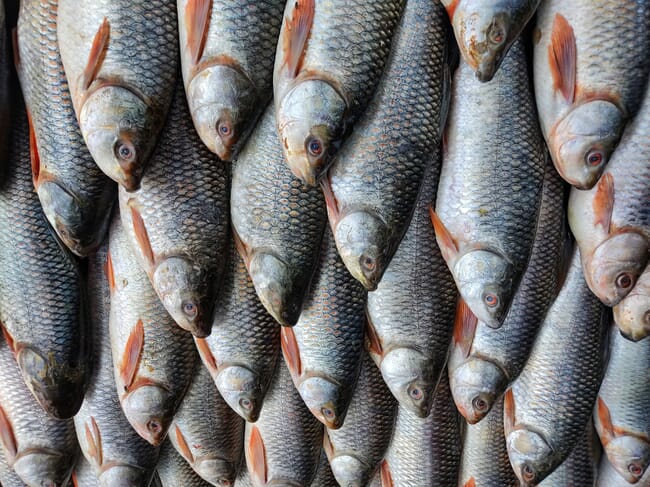
What size is your farm and what species do you produce?
I have 20 ponds spread across an area of 10 hectares. I produce Indian major carp like rohu, catla and mrigal, as well as pangasius.
What is your total production and how do you procure your feed and seed?
The quantity would be difficult to say as we keep on selling the fish at regular intervals. I sell fish worth around 2.5 crore INR (approx. $299,000) every year. I bring juveniles of IMC and sell them once they attain 400-500 grams, after 6 to 7 months.
Seeds are procured from the neighbouring state of West Bengal and market feed is provided to the fish.
What's your typical day at work?
I wake up at around 4 am and rush to the farm, where I take a walk around the ponds and check if everything is alright. I then feed the fish and spend some hours there. The wholesalers come to the farm to buy fish during the day. I also visit the farm in the evening.
What's your biggest worry at work?
Nothing, as I never take any tension in my life and remain relaxed. I am proud to say that I am the biggest fish farmer in the four neighbouring districts of the state. I started my journey from a mud house with thatched roof but have built a palatial house with my hard work and dedication. I have never allowed any negativity to pose a hurdle to my success.
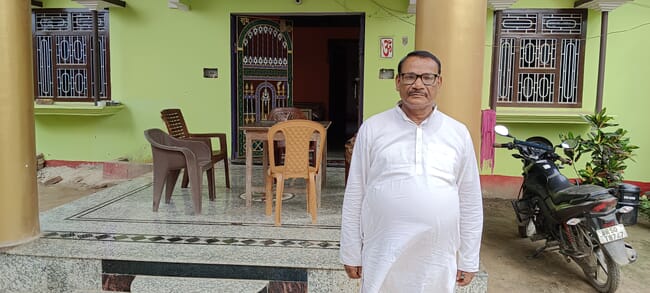
© Gurvinder Singh
Has your farm faced any other financial losses?
I faced a major loss in 2017 when fish worth Rs 17 lakh ($20,347) died. It was again a case of jealousy by locals. It was a peak harvest season and the incident was pre-planned. Such incidents were once common in our state, but now they are declining. Normally, I face mortality worth Rs 5 lakh ($5,984) every year but that’s negligible given my production levels.
Are there any individuals or departments who have supported your career?
Yes, I am thankful to Dr Tun Tun Singh, lecturer at the fisheries training and extension centre in Bihar, who has been guiding me in fish farming and has also helped me with seed procurement. I am also thankful to Pragati Purshottam, area sales manager of Shivshakti Agro India for providing quality feed.
Have you received any recognition for your work?
Yes, I got best fish farmer award at the national fish farmers’ day in 2023.
Is there any equipment you’d like to add to your farm?
We face severe winters here that lead to mortalities and I have often asked scientists to provide me with equipment that would help me to reduce these mortalities.
What are your ambitions?
I am growing old but still I want to expand my business and add more ponds.
Do you have any advice for aspiring fish farmers?
I just want to tell those running after jobs that fisheries is a highly profitable sector and proper expertise can help to earn good money if done with sincerity and dedication. The business requires extensive hard work but also brings good results. I also train new farmers who are venturing out in this business. I have also given livelihood to 30 people and 150 wholesalers buy fish from me for selling in the retail market.


